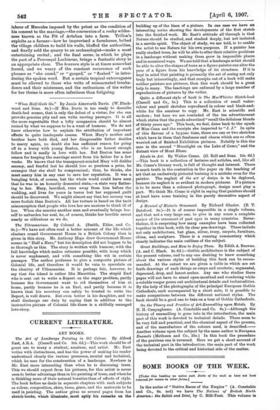"When Half-Gods Go." By Jessie Ainsworth Davis. (W. Black- wood
and Sons. 6e.)—If Mrs. Davis is too ready to describe death-bed scenes, that is only the defect of a virtue, for she can provoke genuine pity and can write moving passages. It is all the more regrettable that a lofty compassion should be almost ruined by what we suppose to be a want of humour. We do not know otherwise how to explain the attribution of important effects to quite inadequate causes. When Mary's mother and brother have both died, and her disagreeable father decides to marry again, no doubt she has sufficient reason for going off in a hurry with young Beaton, who is an honest enough fellow and is madly in love with her. But Beatonhas some reason for keeping the marriage secret from his father for a few weeks. He knows that the transparent-minded Mary will dislike secrecy, and fearful lest he should lose so precious a prize, he arranges that she shall be compromised; thus, he thinks, she must marry him in any case to save her reputation. It was a bungling trick, of course, but the whole world could have seen that he was in an honestly demented state,—R state very flatter- ing to her. Mary, horrified, rune away from him before the wedding, and lives for years in terror lest her supposed guilt should be discovered. We might almost Bay that her secrecy was more foolish than Beaton's. All her torture is based on the tacit misconception that people who love her are anxious to think ill of her. When she marries another man and eventually brings her- self to unburden her soul, he, of course, thinks her terrible secret nearly as ridiculous as we do.










































 Previous page
Previous page